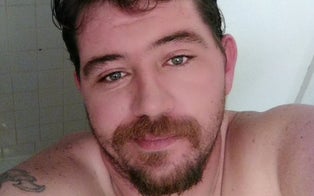With no professional sports credits to his resume, the task at hand is unlike any office job Max Valverde has done and far from any skill needed in a boardroom meeting.
A former software CEO has his eyes set on his next big project: competing in the Milano Cortina 2026 Winter Olympics.
With no professional sports experience to his name, the task at hand is unlike any office job Max Valverde has done and far from any skill needed in a boardroom meeting.
"I just love the idea of lofty goals, impossibilities," Valverde tells Inside Edition Digital. "I love the internet trolls who are like, ‘You'll never make it.’ Because while they're probably right—there's a probable chance I do not make the Olympic team—the fact that there is a chance, I find that tantalizing."
Valverde, 39, started on this journey only a year ago. The father of three family moved to Park City, Utah, two years ago from Amsterdam after he sold his business, FareHarbor. He seriously considered starting another software company, but ultimately decided to go down an alternative path.
“Sometimes you got to look deep down [ and think] what do you really want? I found this old desire to see what the human body can do,” he says. “I had this unique opportunity to say, "What if I could actually train like a pro-athlete 30 hours a week, devote my entire workday to training?’
Growing up, Valverde considered himself an “above average” athlete. He played sports as a kid and rugby in college, “but was never a beast, or the fastest guy. I had to fight every year to make it into the starting lineup,” he says. When Valverde watched the Olympics on TV, especially the sports that draw in less of a viewership, he often wondered: had he had grown up with the time and access such a world, could he have been a contender?
His favorite movie as a kid was "Rudy" because he loves underdog stories. “I just love the idea that Rudy Ruettiger was probably not smart enough to go to Notre Dame, much less large enough to play a minute on the practice field with the Notre Dame football team," he says. "So I used to fantasize about all those things."
But Valverde was also a realist. "I'm also very pragmatic, and didn't let those dreams go too far,” he says.
Valverde went to college for mechanical engineering, and after graduation, got a job in 100% commission credit card processing sales with Heartland Payment Systems in Boston. “I really wanted to get into sales," he says. "I thought that it was a great way to get your face bashed in, and trial by fire, learn a lot about business. And I did. That's what allowed me to eventually be pretty good at building sales teams.”
After appearing on "Shark Tank" to promote an idea, he eventually joined FareHarbor, a company of about 500 employees. Six years later, he became CEO. “When I stepped down from that, that's what kind of freed me up to start pursuing some of these earlier passions,” Valverde says.
But there was one hurdle to clear: He needed to ask his wife.
“She's like, 'Dude, why can't you just say, 'I'll work out for a couple days,' and then check back in?' I'm like, 'No. No. I'm thinking Olympics,'" he says. "She's like, ‘Dude, just exercise for more than two days in a row, and then let's chat.’”
Describing himself as overweight, Valverde says he was out of shape.
“Going up a flight of stairs would kind of wind me a little bit," he says. "If we had to walk on vacation a half a mile or a mile, I would show up at the lunch completely drenched in sweat, and it wasn't even that hot out.”
And yet, Valverde finds himself training for a sport that will be introduced in the Milano Cortina 2026 Winter Olympics. Ski mountaineering, or skimo, is popular in Europe, but hasn't quite caught on yet in the United States.
“It’s definitely a first,” USA Skimo president Jerimy Arnold says of Valverde's mission to make it to the Olympics. “I am also a 40-year-old dad, so I definitely understand where he is coming from. It’s great he is pursuing this so vigorously and he has the opportunity to pursue this dream.”
According to the U.S. Ski Mountaineering Association, the sprint race is a short, fast-paced, fixed-course format consisting of an uphill ski section, a booting section, which involves hiking, and a descent around race gates. The races ascend up to 262 vertical feet and typically last around three minutes in duration. The relay race is a format based on the sprint, which consists of a team of athletes taking turns to complete the course in a continuous circuit.
To make it on the team by 2026, Valverde has to build up his endurance and speed by weight lifting, mountain biking and skiing. He trains five days a week. Everyday, he gets to soak up nature. He’s been documenting the journey on TikTok.
“I love being in the mountains. I love skiing. I love skiing under my own power. There's no chair lifts. You're just running up mountains, skiing down. You can go anywhere," he says. "I'm in the Rocky Mountains here. You can go anywhere. So when I see a peak, it takes me back to early primitive humans.”
The most challenging part, he says, has been losing weight. He says he is about 15 pounds heavier than the current European World Cup winners who are his height. He averages about 4,000 calories a day.
“Because when you train four or five hours a day, you really need to eat," he says. "So sometimes I'll do a four-hour ski or four-hour run, I'll run 15 or 20 miles up through the mountains or something, and I need to eat over 1,000 calories during that, otherwise my glycogen stores get too low, and then I can't do it again tomorrow."
His training is paying off. So far, he's placed 12th at Nationals in the sport.
To make it on the Olympics, Valverde has a few more paths to cross. Skimo spots are limited to 36 athletes total from around the world. Of those competitors, 18 are men. Those spots will be assigned to National Federations based on the performance from sprint athletes in the 2024-2025 World Cup Ski Mountaineering season, which runs from late November through April. The number of spots the U.S. gets to send to the Olympics is based on performance from the 2024-2025 season, though it will max out at two male and two female athletes, according to Arnold.
“The U.S. has to perform that well to get any quota allocation,” Arnold says. To participate in that World Cup season, which will be used to deem the allocations for the Olympics, Valverde will have to be one of the top athletes of the 2023-2024 season.
“I still have a long way to go," he says. "The fastest guy is still 20% faster than me, but I'm getting faster every week, and it's a really great signal, only one year in, to be in the orbit of the World Cup guys.”
Even if he doesn’t make it to the Olympics, Valverde says his experience is helping teach his kids a valuable lesson.
“I wanted to show our kids after selling the software company what hard work is," he says. "I could take a couple years off, just drink a ton of beer, play golf all day, and that could be fun, I guess. But, I also want them to know what hard work is and what working towards a goal looks like.”





